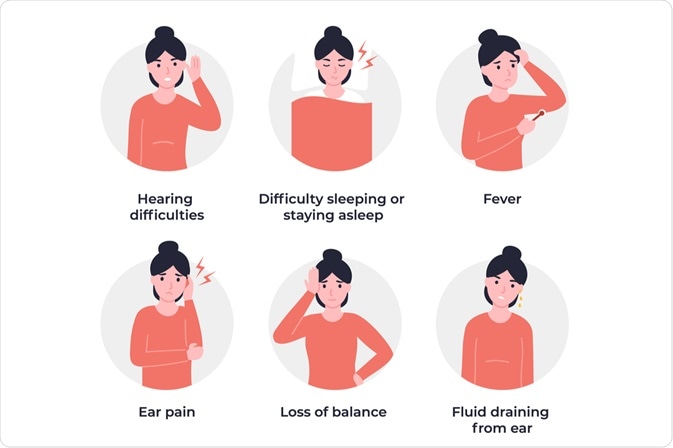The symptoms and potential outcomes of otitis media vary in severity, according to the progression of the condition.
There are several signs that usually present with the inflammation of the middle ear. If adequate treatment is not given, the infection can progress and lead to severe outcomes that may become permanent. Possible outcomes without timely and successful treatment include membrane rupture and hearing loss.

Image Credit: Natty_Blissful / Shutterstock.com
Pain
The primary symptom of otitis media is pain in the area of the ear. In addition to pain, some patients may experience fever and have a decreased appetite. The pain within the ear is also sometimes described as a feeling of fullness.
For infants with the condition, parents may notice that the infant is more irritable than usual. This may present as difficulty sleeping and crying more than usual. The development of these symptoms is a useful indication, as infants are unable to describe that they have pain in their ear, but it is often possible to understand that something is wrong by their irritability.
Upper respiratory symptoms
As an upper respiratory tract infection is often the cause of otitis media; therefore, it is not uncommon for the ear inflammation to be accompanied by symptoms that are typical of this condition. This may include:
- Cough
- Nasal discharge
- Fatigue
- Sore Throat
These symptoms are characteristic of an upper respiratory infection and not otitis media, but are often present, as the two conditions often present together.
Ear discharge
Another possible symptom that may occur is discharge from the ear. However, this is not a symptom that is exclusive to otitis media and can also arise due to trauma and the resulting cerebral spinal fluid drainage from the brain out of the ear.
Membrane rupture
Particularly when the condition is severe, often due to inadequate treatment, pus in the middle ear space may drain out of the ear canal. This occurs because the tympanic membrane perforates, which allows the pus to pass through. It is possible for a substantial quantity to pass through, making the drainage quite obvious.
Despite the fact that a membrane rupture implies a painful and traumatic experience, the vast majority of people who experience this symptom report that they feel a release of both pressure and the previous pain after the membrane has ruptured.
EAR INFECTION With DRAINAGE Time Lapse Video
Hearing loss
When people have recurrent or particularly severe episodes of otitis media, they are at a higher risk of losing their sense of hearing as a result. In most cases, it is fluid in the middle ear or membrane rupture that is responsible for this loss of hearing.
It is not uncommon for people to have minor hearing loss as a direct result of otitis media. Approximately 2.1% of the population is affected, with males more commonly reporting problems than females.
When the inflammation within the ear is prolonged, there is a great risk of ossicular complications. If the tympanic membrane does rupture, the risk of hearing loss is significantly greater. This risk is further increased when a cholesteatoma of granulation tissue is present in the middle ear.
Other complications
When children are affected by hearing loss as a result of otitis media, it can have a dramatic effect on speech development. In fact, some research has found that those affected by this condition are more likely to experience learning difficulties, develop attention disorders, and have problems with social adaptation.
There is also a link with some psychosocial disorders such as anxiety and depression when individuals with long-term complications are compared to those with normal hearing.
References
Further Reading
Last Updated: Dec 21, 2022